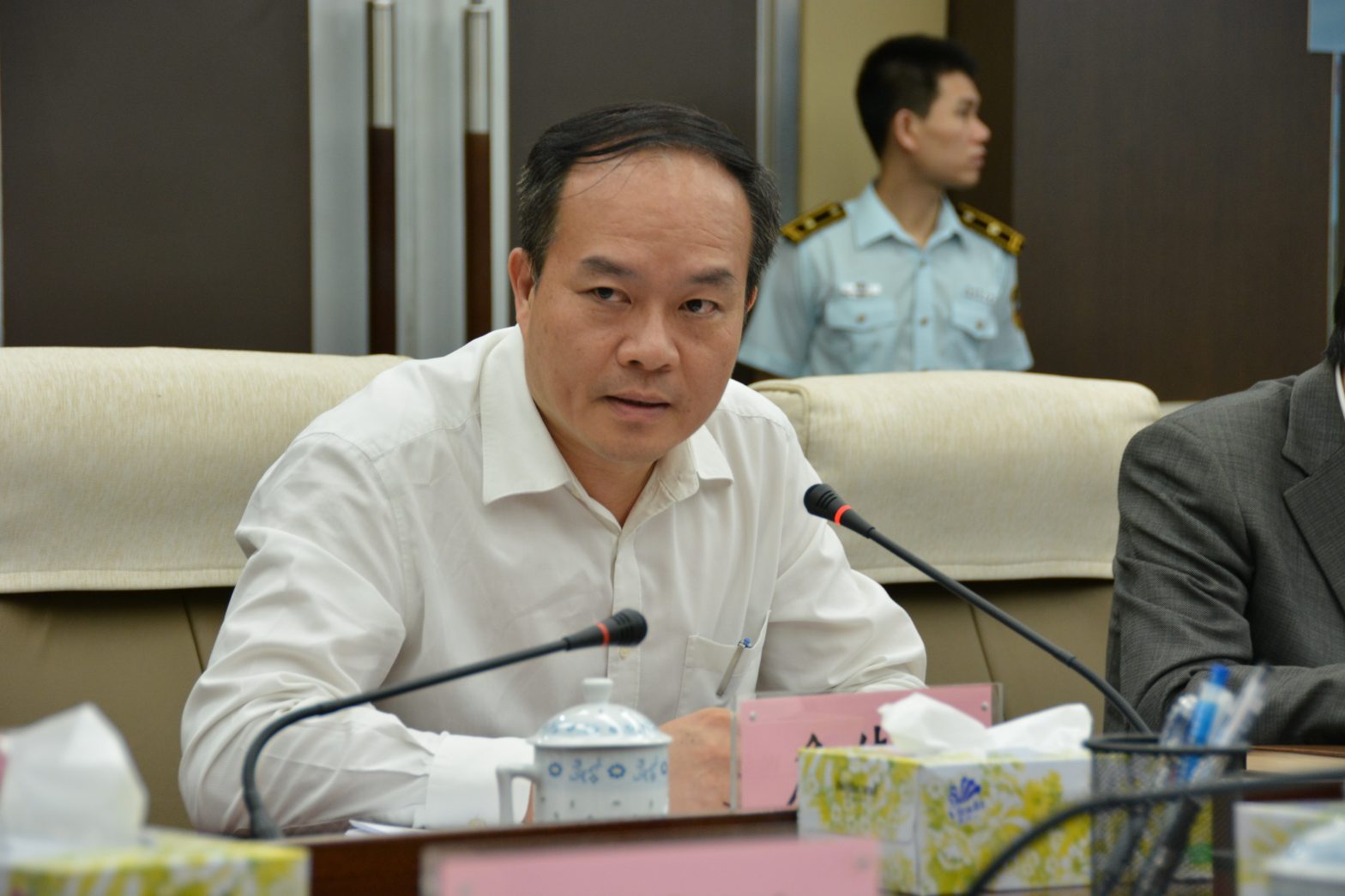
Photo: Wei-Weihan
Interview: Wei Weihan, Director of the Guangzhou Municipal Commission
12 July 2015
by Nick Michell
Kirsty Tuxford spoke to Wei Weihan, Director of the Guangzhou Municipal Commission, about the city’s engagement of children to drive citizens to become better at recycling through its Small Hands Hold Big Hands campaign
Prior to the Small Hands Hold Big Hands project, how much waste was Guangzhou recycling?
Rubbish in Guangzhou city used to amount to 18,000 tonnes a day (22,000 tonnes if counting the metropolitan area), over 91 percent of which ended up in landfill. Following the introduction of the recycling scheme and the classification of different types of waste, recyclable materials are now collected and processed through a recycling system while restaurant kitchen waste is disposed of locally or treated; other waste is taken to landfill or incineration, and toxic waste is treated and rendered harmless. The total amount of recycled materials reached 2.5 million tonnes in 2014, of which glass, wood, plastic (plastic bags) and textiles made up 650,000 tonnes. Thus, recycling has steadily moved forward.
Were there many recycling bins for citizens to deposit recyclable materials? Has the number of recycling points increased as part of the project?
We have gradually strengthened facilities and increased the number of recycling bins for residents with more sorting centres. New recycling transfer stations are also set to be built. The city has set up 3,100 recycling collection points, with 100 percent service coverage. At the same time, we are exploring ways to launch pilot recycling methods for low-value recyclable materials. We have set up a glass recycling facility and last year 150,000 tonnes of waste glass was recycled; we have also constructed four waste wood recycling treatment centres, covering five administrative districts.
How did the idea for youngsters to influence adults come about?
Learning from global experience, we know that it takes several generations for the idea of recycling and rubbish sorting to get across and become rooted in our everyday behaviour. Hence, educating children must be the key to making a far-reaching impact on the future of society. Children are not only important members of their families or kindergartens but also the whole of society, so education prepares them to be responsible citizens. Unlike children, adults find it difficult to abandon their old habits in terms of waste disposal. Consequently, it’s a demanding job for us to promote rubbish sorting among them. But children are open to new things and easily develop good habits.
Also, children are curious and willing to learn; it is fun for them to correct and supervise their parents. With children it is easier to for them to develop and adopt recycling and waste sorting habits. Launching the Small Hands Hold Big Hands project and attaching importance to children’s awareness of the environment can help influence their parents’ behaviour at home. When these children grow up, the philosophy of sorting trash tends to become common sense, much to society’s advantage in the long run.
What is the timeframe for the project? Is it still running? Have you measured its success?
In September, 2012, Guangzhou held a conference on sorting rubbish and recycling of rubbish to promote such activities with the slogan ‘small hands holding big hands, schools leading streets, faculties working together’ summoning all the academic institutions to take the lead and push ahead on the recycling and classification campaign. In May 2014, Haizhu District began a pilot campaign and a demonstration model was established in a school to sort rubbish for recycling. There is no timetable or limit for ‘Small Hands Hold Big Hands’, which means we will continue the campaign and push for better awareness throughout society.
Do you have figures for the amount of waste that has been recycled as a direct result of the project?
The project is important in terms of education and actual practice. Waste from schools is usually recyclable, thus, the common practice is to set up a recycling bin in each classroom, where teachers and students can drop waste paper and other recyclable material. The rubbish is then transferred through the collection network. As for restaurant kitchen waste, some schools can treat the rubbish as they have installed small- scale garbage disposal devices, and the processed garbage can then be used as fertiliser for organic vegetables. The schools and academies separate the dry from the wet garbage through a joint effort by staff and pupils, which strengthens the bond between teachers and students, and promotes harmony between ourselves and nature.
Waste classification is being seen as a subject that will be implemented in schools as part of classroom teaching and extra-curricular activities. What are the challenges of adopting this approach?
Schools have begun classes on sorting waste, achieving positive results. However, some challenges remain. Some schools did not initiate this willingly, because the school authorities were not fully aware of the campaign’s urgency. Additionally, some recycling facilities do not function well or meet the requisite standard; and kindergartens have not pushed the project strongly enough. Hence, the results are not perfect. There is no definite reward or penalty for the effort being made, so there is still ample room for avoidance or arguing, which casts a slightly negative shadow over the project.
Do you have feedback from pupils and teachers about the new things they have learned about separating waste? Do you see a positive impact on citizens’ attitudes to waste since the project began?
In July 2014 we organised the Waste Classification Conference. About 1,000 principals and presidents respectively, and 1,000 students ranging from elementary schools to universities, visited Huoshao Gang Landfill and the Second Thermal Power Plant Branch in Panyu District. Both teachers and students stated how shocking it was for them to see through their own eyes what was happening. From that moment on, they said they would make greater efforts to sort and recycle rubbish and to persuade more people to become involved. Basically, the aim of ‘Small Hands Hold Big Hands’ is to raise schools’ and academic institutions’ awareness, encourage their enthusiasm and lead families and local communities to act as an example for the whole city. Now, over 94 percent of elementary schools and middle schools have volunteered to become demonstration centres for the sorting and recycling of waste.
What was the cost of implementing the Little Hands Hold Big Hands Project? Has the project saved the city money in terms of waste management that was previously dealt with by the authorities?
Since 2012, the project has been important for both the Guangzhou City Management Committee and the Guangzhou Bureau of Education. In 2014, the ‘garbage classification entering communities’ was carried out in Haizhu District schools to reinforce already accomplished achievements, and to establish the ‘Five Ones’: assisting schools to set up an environment- friendly promotion centre; organising a supervision team; designing a waste classification guide; standardisng the campus recollecting system; and pushing forward environment-friendly classes.
Why do you feel that citizen participation is so important when it comes to waste management? Do citizens now feel more of a sense of ownership and responsibility regarding waste?
Everybody produces waste, every household and every community produces waste. Only if every city dweller begins to act, can we decrease the harm produced by the seemingly overwhelming volume of rubbish, and reduce demands on waste collection. If we continue to cling onto bad habits and do not clearly realise the detrimental effect of enormous amounts of rubbish– the waste mountains, the stinky polluted rivers–the trash pit-like-city will become a reality. The way we treat rubbish will influence our life and our surroundings. And we have been longing for a clean green city for so long.
Guangzhou had no precedents to learn from. It is the government’s responsibility to push forward the campaign, meanwhile, it is also every city resident’s obligation to take action. It not only calls for everybody’s involvement but also advocates an environmentally-friendly lifestyle, disposing less rubbish from the start.
In addition, buisness and other social groups should be encouraged to take part in the process, boosting sustainable production and consumption, and improving waste recycling.
Do you plan to use citizen engagement to achieve any other sustainable goals in the city?
Undoubtedly, everybody’s effort is highly appreciated. Waste classification helps us to realise the development of the city and to become a low-carbon, green, happy and comfortable city.







